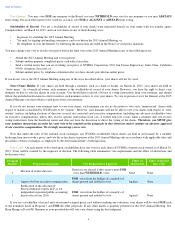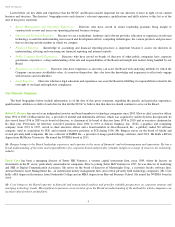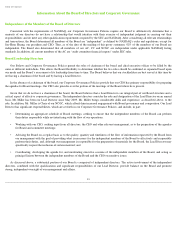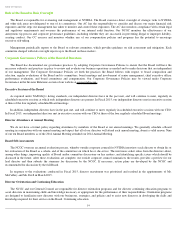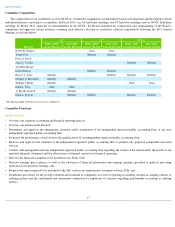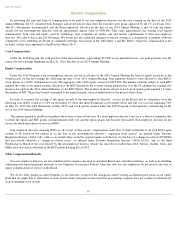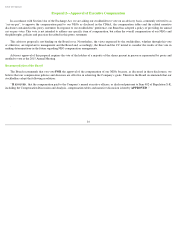NVIDIA 2014 Annual Report Download - page 22
Download and view the complete annual report
Please find page 22 of the 2014 NVIDIA annual report below. You can navigate through the pages in the report by either clicking on the pages listed below, or by using the keyword search tool below to find specific information within the annual report.
Table of Contents
Role of the Board in Risk Oversight
The Board is responsible for overseeing risk management at NVIDIA. The Board exercises direct oversight of strategic risks to NVIDIA
and other risk areas not delegated to one of its committees. Our AC has the responsibility to consider and discuss our major financial risk
exposures and the steps our management has taken to monitor and control these exposures. The AC also monitors compliance with certain legal
and regulatory requirements and oversees the performance of our internal audit function. Our NCGC monitors the effectiveness of our
anonymous tip process and corporate governance guidelines, including whether they are successful in preventing illegal or improper liability-
creating conduct. Our CC assesses and monitors whether any of our compensation policies and programs has the potential to encourage
excessive risk-taking.
Management periodically reports to the Board or relevant committee, which provides guidance on risk assessment and mitigation. Each
committee charged with risk oversight reports up to the Board on those matters.
Corporate Governance Policies of the Board of Directors
The Board has documented our governance practices by adopting Corporate Governance Policies to ensure that the Board will have the
necessary authority and practices in place to review and evaluate our business operations as needed and to make decisions that are independent
of our management. The Corporate Governance Policies set forth the practices the Board follows with respect to board composition and
selection, regular evaluations of the Board and its committees, board meetings and involvement of senior management, chief executive officer
performance evaluation, and board committees and compensation. Our Corporate Governance Policies may be viewed under Corporate
Governance in the Investor Relations section of our website at www.nvidia.com .
Executive Sessions of the Board
As required under NASDAQ’
s listing standards, our independent directors have in the past met, and will continue to meet, regularly in
scheduled executive sessions at which only independent directors are present. In Fiscal 2015, our independent directors met in executive session
at three of the four regularly scheduled Board meetings.
In addition, independent directors have in the past met, and will continue to meet, regularly in scheduled executive sessions with our CEO.
In Fiscal 2015, our independent directors met in executive session with our CEO at three of the four regularly scheduled Board meetings.
Director Attendance at Annual Meeting
We do not have a formal policy regarding attendance by members of the Board at our annual meetings. We generally schedule a Board
meeting in conjunction with our annual meeting and expect that all of our directors will attend each annual meeting, absent a valid reason. Nine
of our ten Board members as of the 2014 Annual Meeting attended our 2014 Annual Meeting.
Board Self-Assessments
The NCGC oversees an annual evaluation process, whereby outside corporate counsel for NVIDIA interviews each director to obtain his or
her evaluation of the Board as a whole, and of the committees on which he or she serves. The interviews solicit ideas from the directors about,
among other things, improving quality of Board and/or committee discussions on key matters, and identifying specific issues which should be
discussed in the future. After these evaluations are complete, our outside corporate counsel summarizes the results, provides a preview for our
lead director and then submits the summary for discussion by the NCGC. If necessary, action plans are developed by the NCGC and
recommended for discussion by the full Board.
In response to the evaluations conducted in Fiscal 2015, director recruitment was prioritized and resulted in the appointments of Mr.
McCaffery and Ms. Drell in March 2015.
Director Orientation and Continuing Education
The NCGC and our General Counsel are responsible for director orientation programs and for director continuing education programs to
assist directors in maintaining skills and knowledge necessary or appropriate for the performance of their responsibilities. Orientation programs
are designed to familiarize new directors with our businesses, strategies, and policies and to assist new directors in developing the skills and
knowledge required for their service on the Board. Continuing education
14


